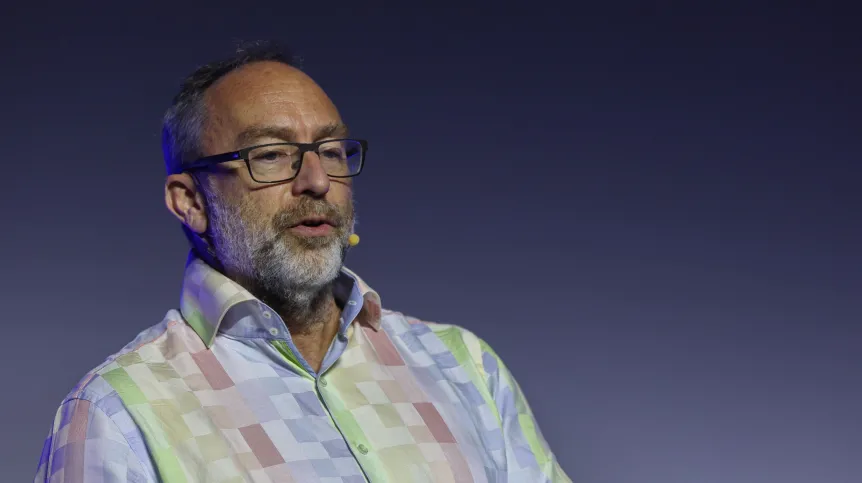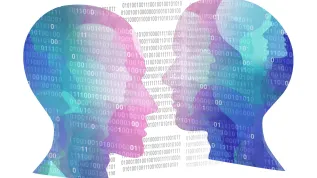
Wikipedia creator Jimmy Wales said in an interview with PAP that artificial intelligence will not be an alternative to the largest online encyclopedia for a long time to come. He added that Wikipedia’s credibility is the responsibility of the vibrant community of volunteers who create it.
Jimmy Wales is an American internet entrepreneur who created Wikipedia in 2001. He is a member of the Wikimedia Foundation’s Board of Trustees, the non-profit that Wales established in 2003 to fund and operate Wikipedia and other Wikimedia projects.
Wales is currently participating in the 19th edition of Wikimania, an international conference of volunteer Wikipedia writers and editors (Wikipedians). The event is being held in Katowice, Poland, and will last until Saturday. During the conference, Wales presented seven Wikimedian of the Year awards to editors particularly involved in developing the project. The awards went to a Ukrainian, a Korean, a German and a Turk, among others.
Each month, Wikipedia is edited by some 265,000 volunteer editors from around the world. The online encyclopedia contains more than 62 million articles in more than 300 languages and is viewed about 15 billion times a month.
PAP: How reliable is Wikipedia?
Jimmy Wales: It's pretty good. I think that's how most people who use it would answer in any case. Wikipedia's credibility is the responsibility of its thriving community.
PAP: Is it possible to create a politically and ideologically neutral source of knowledge?
J.W: This is even a philosophical question. Certainly, different points of view and opinions should be taken into account. We try to make sure that Wikipedia users do not learn about the world from one side, but gain a basis for forming their own opinion.
PAP: Is it easier to be objective based on the opinion of one expert or thousands of authors?
J.W: It's probably best to find the answer somewhere in the middle. Experts can be biased, whereas Wikipedia's strength lies in its collaboration and diversity. Wikipedians have a variety of different expertise and political views. They often disagree on an issue, but together they can describe it fairly. And this is already a big step towards objectivity.
PAP: GPT-4 is partly trained on Wikipedia content. How is artificial intelligence changing Wikipedia?
J.W: The Wikimedia Foundation’s machine learning team is working on many solutions. But I don't think the technology will replace humans in writing articles any time soon. When a GPT chat is to create a Wikipedia entry - it will write something that looks like the articles posted there, and even come up with sources. But the content of such material will be worthless. For entertainment, I often ask GPT chat about my wife, who is not famous, but sometimes appears in the media. And every time the AI comes up with something unbelievable about her.
AI could catch errors we missed, or help us sift through articles. For example, when we want to find out why ducks fly away for the winter, it takes a lot of searching. Meanwhile, artificial intelligence can find a few relevant keywords and quotes from various posts. This can be more useful than the results of a tedious search for keywords such as "duck" or "winter."
PAP: What can GPT4 learn from Wikipedia? What does the world look like from its perspective?
J.W: I hope it's wide and diverse, given the number of sources and articles. We describe in incredible detail even little-known phenomena and facts. That's why I'm very happy that large language models are also trained on Wikipedia, and not just on Twitter. A picture of the world taken from Platform X would be strange, not to say distorted. Wikipedia, on the other hand, is a fairly balanced representation of the world.
PAP: All right, but in Wikipedia, for example, there are about 4,000 entries about the Doctor Who series and half as many articles about Shakespeare. How do you explain that?
J.W: The simplest answer is that there are far more episodes of "Doctor Who" than Shakespeare's plays. Such comparisons are fun, but not necessarily fair. Someone once juxtaposed a sizable article on Pokémon with a more modest entry on China. Only that Pokémon was devoted to that one article, while the material about China includes links to hundreds, thousands more entries.
It is true, however, that compared to the traditional encyclopedia, we are much less snobbish, so to speak. Wikipedia is not a paper, it has almost unlimited capacity. So it can contain entries about each Beatles song individually, which would not be possible in a printed encyclopedia. So why shouldn't we include articles on every topic?
PAP: There is a huge disparity between the number of entries in English and other languages.
J.W: This is one of the most important issues we are dealing with at the moment, and one of the reasons why we hold Wikimania conferences in different places around the world. Some volunteers do use machine translation to help them create new articles, which is especially helpful for rarer languages - those spoken by less than a million people. So we need to reach out to people who would commit to creating articles in their own language.
PAP: About 80 percent of the authors and editors of Wikipedia entries are men. Will the largest online encyclopedia ever become less patriarchal?
J.W: I hope so. We are trying to attract more women, but we still don't quite know why they are in such a minority. I'm not an expert on this issue, but I think in many cases it may have a cultural basis. We create a welcoming environment for volunteers so that they don't experience the hostility, heckling and pressure they may face on social media, for example. Extensive outreach efforts are also a solution. That's why we organize edit-a-thons (a combination of the words "edit" and "marathon," meetings and training sessions for editors – PAP). Their participants, for example, are tasked with improving and expanding articles on notable women.
Today I learned that the longest edit-a-thon, entered in the Guinness Book of World Records, took place last year in Warsaw. Volunteers edited Wikipedia for 100 hours non-stop. Such curiosities help us attract more people to work with us.
PAP: How do you deal with attempts at censorship?
J.W: In various places around the world, for example in China, Wikipedia is blocked. In Turkey we fought the blockade in court, the case even reached the Supreme Court – and we won.
Governments are unlikely to be interested in censoring Wikipedia because it is not a platform for protests, which are salt in the eye of authoritarian governments. Yes, sometimes they don't like that it presents facts that are inconvenient for them, but autocrats are much stricter with social media.
We are protected from censors' temptations by our popularity. People love Wikipedia; they believe it has a positive impact on society. It is a huge source of knowledge created by countless volunteers. Blocking Wikipedia means admitting that one is not on the side of truth, that one is contradicting the facts.
PAP: And what does "fact" mean today?
J.W: A statement that corresponds to reality. On Wikipedia we want to present facts and verifiable information, so we use texts from respected newspapers, information verified by experienced editors and academic publications. Verifying and understanding facts requires intellectual effort. Facts don't come from Elon Musk's tweets uploaded in the morning.
PAP: How is Wikipedia changing?
J.W: First of all, Wikipedia editors are working to expand it in the languages of developing countries. For example, the number of entries in Swahili has already exceeded one million. The Foundation is constantly improving the software. As a result, you don't need great technical skills to be a Wikipedia editor.
We will certainly not transform Wikipedia into a service with short videos. We will still be an encyclopedia based on the word. In many ways, I think in 10 years we will be using Wikipedia in a similar way. We'll still get answers from an encyclopedia, created on the basis of high-quality information, rather than from a large language model that has absorbed random data from the internet.
PAP: Wikipedia is ad-free and run by a non-profit. Will that ever change?
J.W: We are happy with the current business model. The vast majority of Wikipedia's money comes from small donations from our contributors. They have made us successful, so there is no reason to change this system.
PAP: Have you started any Wikipedia articles?
J.W: Yes, a few, but a long time ago. I once wrote about a certain restaurant in South Africa that was a meeting place for people from all walks of life - celebrities and ordinary people from the area. It had significance for a country as divided as South Africa was at that time. That article can still be found on Wikipedia.
PAP: What entry made you laugh recently?
J.W: Oh, I laughed out loud many times at the article "Inherently funny word". For a long time people simply put words there that amused them. And since this is not the essence of the encyclopedia, the entry was to be removed. However, someone pointed out that it was a contribution to the theory of humor, so volunteers traced the sources of the entries posted there, and the article survived. I like it very much.
PAP: You meet with Wikimedians every year at meetings such as the one currently underway in Katowice. What do you have to say to them?
J.W: First of all: thank you. For the time and heart they put into working on a project so necessary in a world mired in hostility and hate. I thank them for creating a better world.













